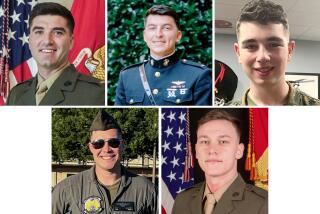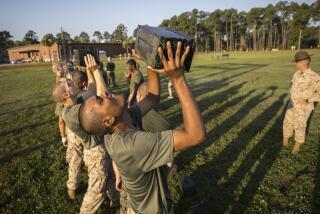Marines Rest, Play, Write ‘Just in Case’ Letters
- Share via
NEAR FALLOUJA, Iraq — The Marines call it “rest and refit” -- a time to kick back, catch up on some letters home, listen to music.
Saturday was one of those days. After weeks of sometimes intense training for an invasion of rebel-held Fallouja, Marines tossed footballs, batted around a baseball fashioned from tape, played cards, made trips to the PX.
“You got to have that break,” said 1st Sgt. Jose Andrade of Charlie Company, 1st Battalion, 8th Marine Regiment, one of the units poised for attack on the edge of town. “Marines can put their game face on when they need to. But it’s unforgiving out there. We’re targets.”
It may have been their last day off for a while.
Final preparations and fine-tuning continued. The daily artillery and aerial bombardments of Fallouja continued. Marines disassembled their weapons, brushing out the grit and lubricating moving parts. Commanders reviewed assault routes. The troops readied packs, contemplating how much personal gear to bring to a battle that could last for many sleepless days and nights.
For some in Charlie Company, thoughts turned to mortality, not usually a prime topic among young men in their late teens and 20s, some barely out of high school. But casualties are inevitable in any battle for Fallouja.
More than a few Marines spent time fashioning “just in case” letters -- missives of thanks, appreciation and farewell to loved ones back home, sometimes left with buddies or stuffed in a flak jacket, the better not to alarm relatives unnecessarily.
“That’s the first time I thought about death,” said Lance Cpl. Stephen Ross O’Rourke, 19, of Cincinnati, who had just addressed one to his father, though he didn’t send it. “I don’t think anyone should have to write a letter like that.”
Asked about what he wrote, O’Rourke said, “Just memories.”
Such correspondence is practically as ancient as warfare. Behind the bravado of everyday barracks banter is a recognition that a single bullet or shard of shrapnel could hit its mark, leaving loved ones to grieve.
“It’s a weight off your shoulders,” Lance Cpl. Chris Stepp, 19, of Tennessee said of his letter. “You know things are taken care of, just in case.”
Mostly, however, the Marines here appeared upbeat. Many were practically bursting with anticipation, sensing they were about to embark on a historic chapter in service history.
“This is why you join the Marine Corps,” said Stepp, taking a break on the concrete patio outside the barracks.
His friend Lance Cpl. Dan Dawe interjected: “At least that’s why grunts join the Marine Corps.”
They chafe for action -- and a shot at Fallouja, the worldwide symbol of defiance against U.S. power, the place where four American contractors were killed last spring and their bodies mauled in a scene televised worldwide.
“We’ve been wanting to go into Fallouja for a long time,” said Lance Cpl. Michael Fleharty, a 29-year-old from Detroit who majored in English and anthropology at Western Michigan University and is among the older Marines in his barracks. “This is the place where they hung Americans from a bridge.”
Cpl. Yuriy Shirinyan, 21, who moved to Hollywood from Russia when he was 14, has special reason to want a run at Fallouja. His platoon was patrolling near the city last July when a roadside bomb almost killed him. He escaped with a concussion when his helmet stopped a shard of shrapnel.
His best friend, Cpl. Miguel Perez, was shot in the ensuing firefight that night and is recovering from his wounds.
“This is payback,” Shirinyan said. “Anyone who says he’s not nervous, who thinks he’s too hard-core to be nervous, is probably going to get hurt. We’re all nervous, but you have to fall back on your training as a Marine.”
Although the conflict in Iraq has been bloody, set-piece battles such as the one looming in Fallouja -- the kind of combat that Marines say they are especially good at -- have not been the norm.
The enemy has been mostly a phantom, the hidden force behind a planted roadside bomb, a lethal rocket-propelled grenade, a sniper’s bullet.
“Mostly, the enemy here has had a chance to tuck and run,” Fleharty said, taking a break from reading a book. “Well, there’s no place for them to run anymore.... Hopefully, they’re not going to be able to filter back into the population like they’ve done before.”
More to Read
Sign up for Essential California
The most important California stories and recommendations in your inbox every morning.
You may occasionally receive promotional content from the Los Angeles Times.










